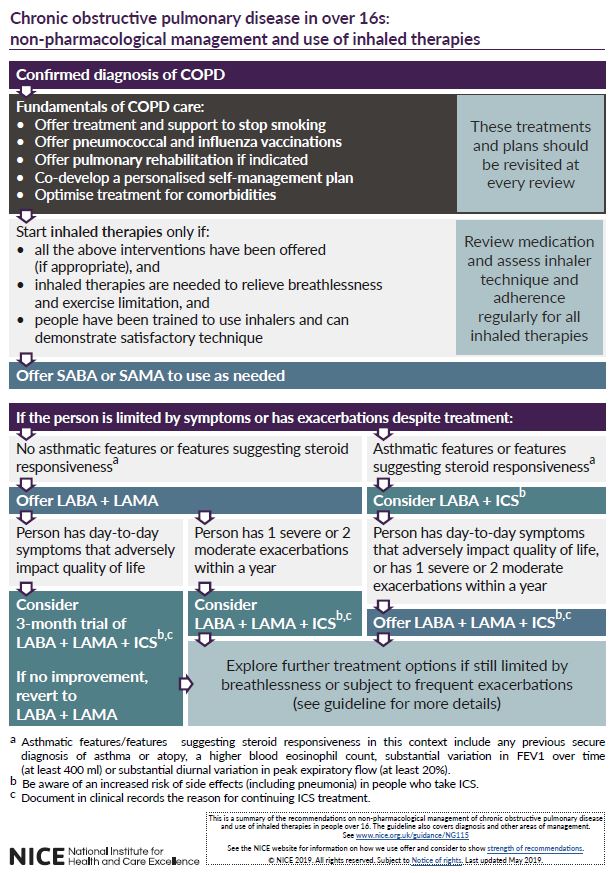Overview
This guideline covers diagnosing and managing chronic obstructive pulmonary disease or COPD (which includes emphysema and chronic bronchitis) in people aged 16 and older. It aims to help people with COPD to receive a diagnosis earlier so that they can benefit from treatments to reduce symptoms, improve quality of life and keep them healthy for longer.
NICE has also produced a guideline on antimicrobial prescribing for acute exacerbations of COPD.
Last reviewed: 12 January 2022
We checked this guideline and it will not be updated at this time. For more information, see the surveillance decision.
This guideline updates and replaces NICE guideline CG101 (June 2010), and evidence summaries ESNM8, ESNM9, ESNM21, ESNM33, ESNM47, ESNM49, ESNM52, ESNM54, ESNM57, ESNM72, ES17 and ES18.
Next review: This guideline will be reviewed if there is new evidence that is likely to change the recommendations.

NICE has also produced a visual summary covering non-pharmacological management and use of inhaled therapies.
Recommendations
In July 2019, we reviewed the evidence and made new recommendations on:
These supplement the existing recommendations on:
- diagnosing COPD using symptoms, spirometry and other tests
- managing stable COPD using nebulisers, oral therapy and pulmonary rehabilitation
- multidisciplinary management of stable COPD, including physiotherapy, occupational therapy, nutrition and palliative care
- managing exacerbations of COPD in primary care and in hospital
Who is it for?
- Healthcare professionals
- Commissioners and providers
- People with COPD and their families and carers
Guideline development process
Your responsibility
The recommendations in this guideline represent the view of NICE, arrived at after careful consideration of the evidence available. When exercising their judgement, professionals and practitioners are expected to take this guideline fully into account, alongside the individual needs, preferences and values of their patients or the people using their service. It is not mandatory to apply the recommendations, and the guideline does not override the responsibility to make decisions appropriate to the circumstances of the individual, in consultation with them and their families and carers or guardian.
All problems (adverse events) related to a medicine or medical device used for treatment or in a procedure should be reported to the Medicines and Healthcare products Regulatory Agency using the Yellow Card Scheme.
Local commissioners and providers of healthcare have a responsibility to enable the guideline to be applied when individual professionals and people using services wish to use it. They should do so in the context of local and national priorities for funding and developing services, and in light of their duties to have due regard to the need to eliminate unlawful discrimination, to advance equality of opportunity and to reduce health inequalities. Nothing in this guideline should be interpreted in a way that would be inconsistent with complying with those duties.
Commissioners and providers have a responsibility to promote an environmentally sustainable health and care system and should assess and reduce the environmental impact of implementing NICE recommendations wherever possible.